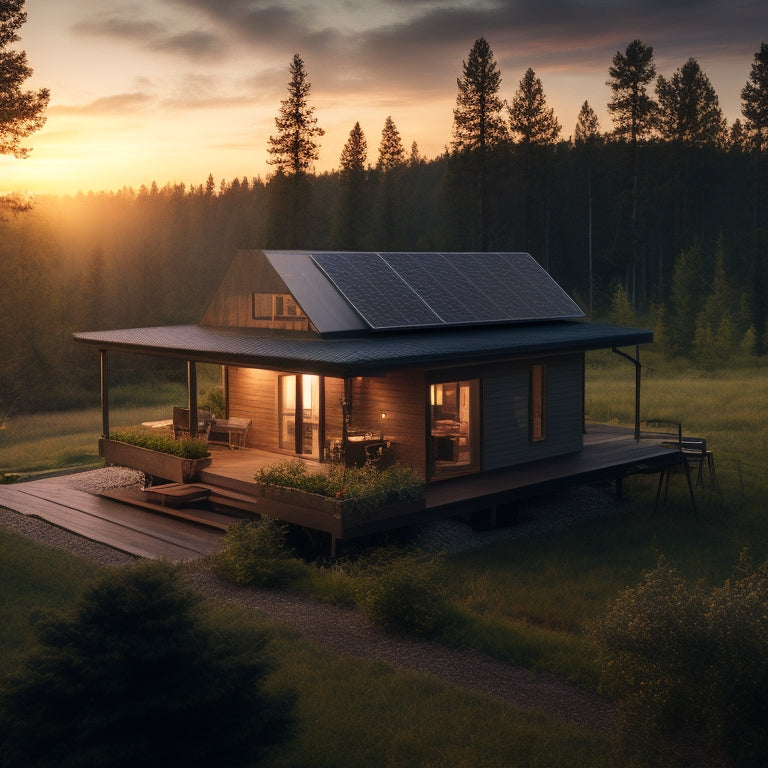
Building and Maintaining Off Grid Solar Power Systems
Share
When building and maintaining off-grid solar power systems, you'll need to conduct thorough load analysis, prioritize energy efficiency, and guarantee system scalability for future energy needs. Select suitable components, like efficient solar panels and compatible inverters, and follow manufacturer guidelines during installation. Don't forget to assess energy storage options, such as batteries, and balance energy needs with cost and complexity. Regular maintenance, like cleaning solar panels and monitoring system performance, is vital for peak efficiency and longevity. By following these guidelines and staying informed on the latest technology advancements, you'll be well on your way to creating a reliable and sustainable off-grid solar power system that meets your energy needs, and there's more to investigate to secure its peak performance.
Key Takeaways
- Conduct thorough load analysis and site assessment to determine energy requirements and ensure system suitability.
- Select and integrate high-efficiency solar panels, inverters, and charge controllers for optimal system performance.
- Ensure proper installation, setup, and testing of the system to validate performance and safety.
- Choose suitable energy storage solutions, such as batteries, and backup power sources, like solar generators, to meet power demands.
- Regularly inspect and maintain the system to prevent issues, and troubleshoot problems promptly to ensure continuous power supply.
System Design and Planning
You're about to commence designing an off-grid solar power system, and a well-planned system is vital to confirm it meets your energy needs efficiently and effectively. To achieve this, you'll need to conduct a thorough load analysis to determine your energy requirements.
A site assessment will also be necessary to evaluate the suitability of your location for solar power generation. Energy efficiency should be a top priority, so consider incorporating energy-saving measures into your system design.
System scalability is key, as it will allow you to expand your system as your energy needs grow. Regulatory compliance is another important aspect, so make certain you're aware of and adhere to all relevant regulations and standards.
Weather considerations, such as the amount of sunlight your location receives, will also impact your system's performance. Financing options and technology advancements should also be investigated to make certain you're getting the best value for your investment.
Choosing the Right Components
With your off-grid solar power system's design and planning phase complete, it's now time to select the ideal components to bring your system to life. You'll need to choose solar panels, an inverter, a charge controller, and a battery bank that work together seamlessly.
When selecting solar panels, consider the type and efficiency. Monocrystalline panels offer high efficiency but are more expensive, while polycrystalline panels provide a better balance of cost and performance. Thin-film panels are a cost-effective option but have lower efficiency.
| Component | Key Considerations | Ideal Characteristics |
|---|---|---|
| Solar Panels | Efficiency, type, durability | High efficiency (18-22%), durable, resistant to environmental factors |
| Inverter | Efficiency, compatibility, surge capacity | High efficiency (95-98%), compatible with your system, sufficient surge capacity |
| Charge Controller | Compatibility, maximum power point tracking, overcharge protection | Compatible with your solar panels and battery bank, efficient MPPT, reliable overcharge protection |
Choose an inverter with high efficiency and sufficient surge capacity to handle power spikes. Your charge controller should have efficient maximum power point tracking and reliable overcharge protection to guarantee your battery bank's longevity. By selecting the right components, you'll guarantee your off-grid solar power system operates efficiently and reliably.
Installation and Setup Procedures
During the installation and setup of your off-grid solar power system, precision and attention to detail are vital to secure a safe, efficient, and reliable operation.
You'll need to conduct a thorough site assessment to identify any potential obstacles, such as shading, wind direction, and electrical infrastructure. This assessment will help you determine the best system design and layout for your specific location.
Next, verify you're meeting all regulatory compliance requirements, including obtaining necessary permits and adhering to local building codes.
It's important to follow manufacturer guidelines and industry standards when installing your solar panels, mounting structures, and electrical components. Properly connect and configure your system's electrical components, including inverters, charge controllers, and wiring.
Finally, perform a series of tests to validate your system's performance and identify any potential issues before energizing the system.
Energy Storage and Backup
You'll need to carefully consider your energy storage and backup options to guarantee your off-grid solar power system can provide reliable power when the sun isn't shining.
The right battery selection criteria will help you choose the most suitable energy storage solution for your specific needs.
You'll also need to determine your backup power sources and energy storage capacity to guarantee you have a steady supply of power during extended periods of low sunlight or system downtime.
Battery Selection Criteria
Five key factors dictate your choice of battery for an off-grid solar power system: depth of discharge, round-trip efficiency, cycle life, maintenance requirements, and compatibility.
You'll want to take into account these factors to guarantee your battery selection meets your energy storage needs.
Depth of discharge refers to the percentage of the battery's capacity that can be safely used without damaging the battery.
Round-trip efficiency is the ratio of energy output to energy input, with higher efficiencies meaning less energy is wasted.
Cycle life is the number of charge/discharge cycles a battery can handle before its capacity degrades.
Lithium batteries offer advantages like high round-trip efficiency and long cycle life, but lead acid batteries have drawbacks like lower efficiency and shorter lifespan.
You'll need to balance these factors with maintenance requirements, such as regular watering for lead acid batteries.
Temperature effects, capacity ratings, and discharge rates are also significant considerations.
Finally, look for batteries with recycling options to minimize waste.
Backup Power Sources
As the sun dips below the horizon, your off-grid solar power system relies on backup power sources to keep the lights on and critical appliances running.
You'll need a reliable backup plan to guarantee continuous power supply during extended periods of low solar radiation or at night. This is where solar generator options come into play. A solar generator is fundamentally a battery-based system that stores excess energy generated by your solar panels during the day for use at night or during power outages.
You can also consider alternative energy solutions like wind turbines or diesel generators as backup power sources. However, these options require careful consideration of factors like noise, maintenance, and fuel costs.
When selecting a backup power source, you'll need to evaluate your energy needs and balance them with the cost and complexity of the system. By doing so, you can assure that your off-grid solar power system remains reliable and efficient, even when the sun isn't shining.
Energy Storage Capacity
When it comes to backup power sources, solar generators rely on a vital component: energy storage capacity. This component is necessary for guaranteeing your off-grid solar power system provides reliable power when the sun isn't shining. You need to take into account the energy storage capacity of your system to make certain it can meet your power needs during periods of low solar capacity.
Here are key factors to keep in mind when evaluating energy storage capacity:
-
Battery Lifespan: The lifespan of your batteries directly impacts the overall efficiency and cost-effectiveness of your system. Look for batteries with a long lifespan to minimize replacement costs and enhance energy efficiency.
-
Load Management: Proper load management is fundamental to guarantee your energy storage capacity meets your power needs. You need to balance your energy storage capacity with your power demand to avoid overloading or underutilizing your system.
-
System Scalability: A scalable energy storage system allows you to easily upgrade or modify your system as your power needs change. This flexibility is necessary for making sure your system remains efficient and cost-effective over time.
-
Cost Analysis: Conduct a thorough cost analysis to determine the best energy storage capacity for your system. Consider the upfront cost of batteries, maintenance costs, and the overall cost of ownership.
-
Technology Advancements: Stay up-to-date with the latest technology advancements in energy storage to make sure your system remains efficient and effective.
Ongoing Maintenance Tasks
You'll need to perform regular checks and maintenance tasks to guarantee your off-grid solar power system operates at peak efficiency and longevity. Regular inspections will help identify potential issues before they become major problems.
Make it a habit to clean your solar panels every 6-12 months to confirm optimal energy absorption. System monitoring allows you to track performance and make adjustments as needed.
Inverter maintenance is essential to guarantee efficient energy conversion. Keep an eye on your battery health by monitoring charge cycles, depth of discharge, and overall condition.
Weather preparedness is key, so verify your system is secured and protected from extreme weather conditions. Performance enhancement involves adjusting settings and configurations to maximize energy production.
Finally, prioritize safety practices, such as wearing protective gear and following proper lockout/tagout procedures, to prevent accidents and injuries.
Troubleshooting Common Issues
Regular maintenance helps prevent issues, but sometimes problems still arise. When they do, it's crucial to identify and address them quickly to guarantee your off-grid solar power system operates efficiently and effectively.
Some common issues to watch out for include:
- Faulty connections causing voltage drops or wiring problems
- Inverter issues resulting from overloading circuits or poor sunlight
- Panel shading reducing energy output
- Battery degradation impacting system performance
- Wiring problems or faulty connections leading to electrical fires or system failure
When troubleshooting, start by checking the system's monitoring data to identify the source of the problem.
Then, inspect the system components, looking for signs of wear, damage, or malfunction. Make any necessary repairs or replacements, and verify all connections are secure and clean.
Frequently Asked Questions
Can I Use Off-Grid Solar Power for My Entire House?
You can achieve energy independence by using off-grid solar power for your entire house, but it requires careful system sizing to guarantee your energy needs are met, considering factors like load calculation, panel array size, and battery bank capacity.
How Do I Connect My System to the Grid if Needed?
Savvy seekers of sustainable energy, you're wise to weigh your grid connection options. To seamlessly sync with the grid, you'll need grid integration knowledge and a hybrid system that harmoniously blends solar power with traditional energy sources, ensuring a reliable and efficient energy flow.
Are Off-Grid Solar Systems Suitable for Extreme Weather?
You'll want to make certain your off-grid solar system's weather resilience and system durability when facing extreme conditions; look for high-quality components, sturdy mounting systems, and weather-tight connections to guarantee reliable power generation, even in harsh environments.
Can I Add More Panels to My Existing System Later?
Did you know 85% of off-grid solar users upgrade their systems within 5 years? You can definitely add more panels later, but guarantee panel compatibility and consider installation intricacies, like reconfiguring wiring and inverters, to optimize your expanded system's performance.
Will My System Still Work During a Power Outage?
During a power outage, you'll still have electricity if your system's designed with outage solutions in mind, ensuring system reliability; a battery bank and backup inverter will keep your lights on when the grid goes dark.
Related Posts
-

Master Advanced Solar Panel Design Online for Free
You can master advanced solar panel design online for free by leveraging specialized courses and training platforms, ...
-

Top Online Stores for Solar Car Accessories
When searching online for solar car accessories, you'll find top retailers like Amazon, REI Co-op, and Best Buy offer...
-

5 Ways Bike Sharing Boosts Urban Sustainability
As you explore bike-sharing options, you'll discover five ways it boosts urban sustainability. By reducing congestion...


